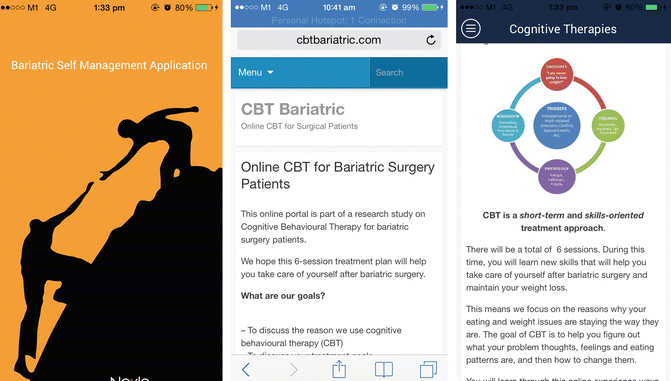Fig. 21.1
Web-based interface
Figure 21.2 illustrates the smartphone version of the online web-based cognitive behavioral portal. The smartphone version includes not only the six core modules of the cognitive behavioral therapy programs but has also included other innovative features. The smartphone application includes a weekly weigh tracker as well as a daily mood tracker for patients to monitor their weight and mood accordingly. In addition, the smartphone application also features a unique visual pill tracker to help patients monitor their vitamin supplementations that they might be prescribed. It also includes a contact resource for patients. Based on the analysis of the initial data, it showed that patients were receptive towards such a modality of intervention. In particular, participants who stayed more than 40 miles from a bariatric center are particularly receptive towards such an intervention .


Fig. 21.2
Smart-phone interface
21.6.2 Bariatric Aftercare Application
Based on the previous reviews, most of the current obesity or weight management applications on the app stores are limited to the following: patient education, patient discussion forums, and weight management using hypnosis. There seemed to be a paucity of smartphone innovations and applications that could help individuals self-manage their weight issues. In contrast, conditions such as cystic fibrosis have applications that helped individuals self-manage their own conditions [11]. Conditions such as pain disorders also have smartphone applications that allow individuals to manage and monitor their own pain [12].
Taking into consideration previous literature, the team at TWH-BSP conceptualized and developed an aftercare application. The conceptualized application contains information about the various appointments, as well as information about routine blood works and vitamin supplementation. A user perspective survey was conducted after implementation and showed that the vast majority of patients felt that the information components of the application were useful, especially so with regard to the aspect of the application that provides information about each appointment. The vast majority of the participants also felt that the ability of the application to help them in rescheduling their appointment was also significantly helpful. Of importance, the introduction of the smartphone application has helped to change users’ perceptions and confidence about their ability to manage their own condition. After the implementation of the smartphone application, 25 % of the sample group reported being extremely confident about managing their own condition, as compared to 17 % prior [13].
Case Vignette Discussion
As mentioned, Carla is a 30-year-old female with severe obesity who has been referred for bariatric surgery. She has comorbid psychiatric conditions, and hence she has been recommended to see the team psychologist prior to undergoing surgery. The web-based and smartphone CBT module might be applicable in her case, as she lives far from the hospital and cannot miss additional days from work. It could be used as a replacement for in-person CBT or as an adjunct to the existing sessions that she could be attending at her town.
The bariatric aftercare self-management application would also be helpful for her to monitor her progress after the surgery. She would be provided with updated information about what to expect at each of the appointments, as well as the required laboratory investigations that would have to be done at specific time points post-surgery. In addition, she would also be able to find out more about her required vitamin supplementations after surgery and the potential changes in her psychiatric medications.
The physical activity tracker application would help her to track her daily physical activity levels and enable her to keep a log of her daily activities. In addition, it would also help her to trend her weight loss over time.
21.7 Summary and Take Home Messages
With the rapid advances in technology, bariatric care , like other specialties, has been massively transformed by technological innovations. There are a multitude of bariatric-related applications in the smartphone stores currently. Prior research has highlighted the limitations of these smartphone innovations, in that most of them are lacking in evidence base. A recent analysis of the information quality of bariatric smartphone applications has also reinforced this viewpoint. It is the objective of this chapter to illustrate to healthcare professionals how advances in technology could be implemented successfully in promoting obesity self-management. In addition, the authors also wish to highlight how evidence-based approaches could be incorporated into bariatric applications could be incorporated into bariatric applications to better support patients and their providers in severe obesity care.
Stay updated, free articles. Join our Telegram channel

Full access? Get Clinical Tree





